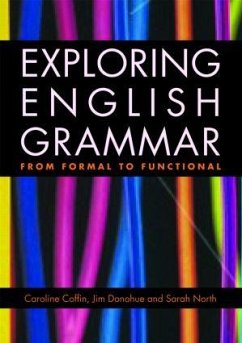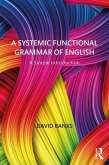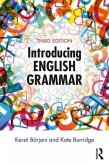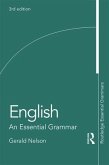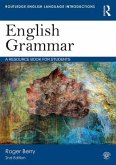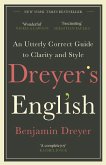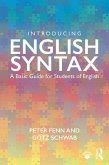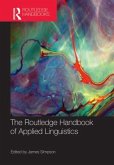This engaging textbook bridges the gap between traditional and functional grammar. Starting with a traditional approach, students will develop a firm grasp of traditional tools for analysis and learn how SFG (Systemic Functional Grammar) can be used to enrich the traditional formal approach.
Using a problem-solving approach, readers explore how grammatical structures function in different contexts by using a wide variety of thought-provoking and motivating texts including advertisements, cartoons, phone calls and chatroom dialogue. Each chapter focuses on a real world issue or problem that can be investigated linguistically, such as "mis"-translation or problems arising from a communication disorder. By working on these problems, students will become equipped to understand and analyze formal and functional grammar in different genres and styles.
With usable and accessible activities throughout, Exploring English Grammar is ideal for upper undergraduate and postgraduate students of English language and linguistics.
Hinweis: Dieser Artikel kann nur an eine deutsche Lieferadresse ausgeliefert werden.
Using a problem-solving approach, readers explore how grammatical structures function in different contexts by using a wide variety of thought-provoking and motivating texts including advertisements, cartoons, phone calls and chatroom dialogue. Each chapter focuses on a real world issue or problem that can be investigated linguistically, such as "mis"-translation or problems arising from a communication disorder. By working on these problems, students will become equipped to understand and analyze formal and functional grammar in different genres and styles.
With usable and accessible activities throughout, Exploring English Grammar is ideal for upper undergraduate and postgraduate students of English language and linguistics.
Hinweis: Dieser Artikel kann nur an eine deutsche Lieferadresse ausgeliefert werden.
'This is a book that has long been needed. Anybody involved in teaching Systemic Functional Linguistics will be immensely grateful to have a resource which handles the difficult transition from 'school grammar' to 'useful grammar' with such intelligence, thoroughness and flair. Anyone interested in exploring how language works, and in developing their skills of linguistic analysis, will find this book stimulating, supportive and thought-provoking.'
Geoff Thompson, Senior Lecturer in Applied Linguistics, University of Liverpool, UK
'This is the book we've been waiting for - a bridge between traditional grammar and the more functional approach to grammar which focuses on 'language as a resource for meaning'. Full of practical activities and written in an accessible manner, this book will become an indispensable reference for those interested in how language works.'
Beverly Derewianka, Professor of Language Education, University of Wollongong, Australia
'Exploring English Grammar represents a bold and innovative attempt to present university level grammar from a functional perspective without losing sight of the formal conventions. ...by the end of the book, through the careful staging of the many activities provided, along with the worked answers, students should have built up a broad range of skills for describing and analysing texts in terms of the various levels of meaning that they make.'
Dr Tom Bartlett, Centre for Language and Communication Research, Cardiff University, UK
Geoff Thompson, Senior Lecturer in Applied Linguistics, University of Liverpool, UK
'This is the book we've been waiting for - a bridge between traditional grammar and the more functional approach to grammar which focuses on 'language as a resource for meaning'. Full of practical activities and written in an accessible manner, this book will become an indispensable reference for those interested in how language works.'
Beverly Derewianka, Professor of Language Education, University of Wollongong, Australia
'Exploring English Grammar represents a bold and innovative attempt to present university level grammar from a functional perspective without losing sight of the formal conventions. ...by the end of the book, through the careful staging of the many activities provided, along with the worked answers, students should have built up a broad range of skills for describing and analysing texts in terms of the various levels of meaning that they make.'
Dr Tom Bartlett, Centre for Language and Communication Research, Cardiff University, UK

